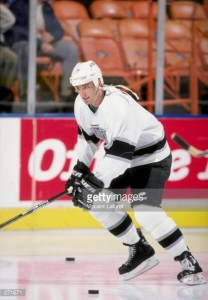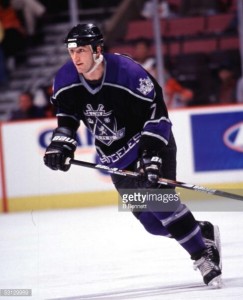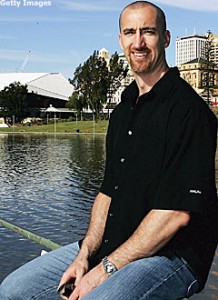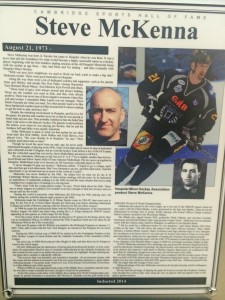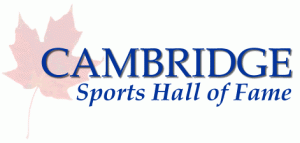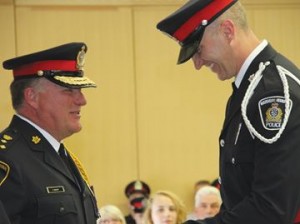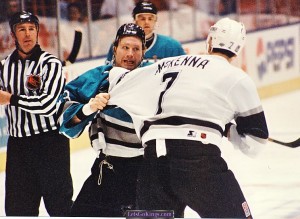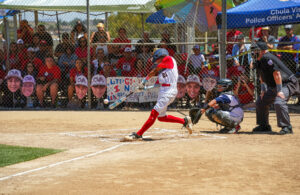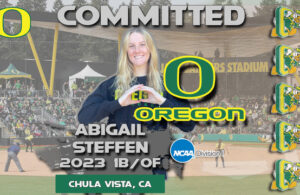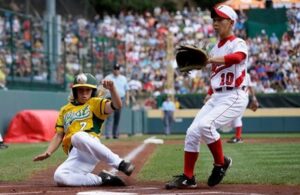Interview with Former LA King Steve McKenna
- By Jeff Duarte
- Updated: December 22, 2015
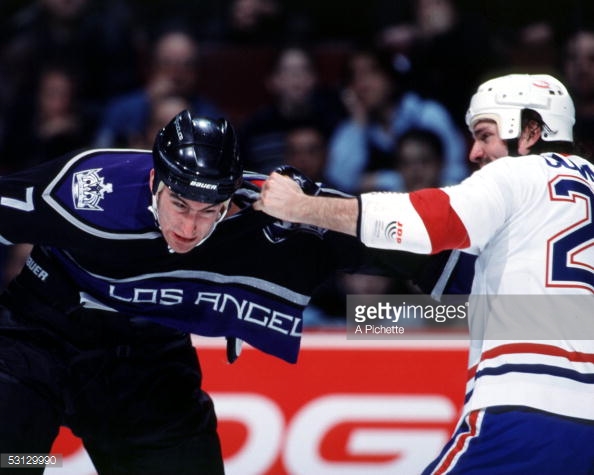
Thank you again Steve for letting me interview you today for CaliSports News.
Oh of course. Anytime.
Growing up as a child, who were your influences and idols that helped you decide to become a professional hockey player?
Right from an early age we were always into sports. My dad, I wouldn’t say was a big athlete but he was always playing sports, always playing road hockey but I always have to say my mom was the first one to get me on the ice. I think at the age of 3, the mothers would get together at the middle of the afternoon that had newborns or young children and we’d be on the ice. Mom was the first to take us on the ice and the first to kind of show me how to skate around. She was an athlete back in her day as well so I’d have to say my parents. They always were the one that got me into sports, myself and my two brothers. They never missed a sports event, no matter what was going on in our lives. I never really thought about playing pro until my third year of university but sports was just something for friends and to hang out and socialize and activity. It turned out well.
You started as a professional hockey player by playing for the Phoenix Roadrunners in the old International Hockey League. With all the troubles the Phoenix/Arizona Coyotes have faced since day 1, especially with a lack of attendance from fans, how was your experience playing in Phoenix and how did you find that fan base?
I think for our team in terms of being in the minor level as opposed to the Coyotes was a little different. Our fan base was a little different, the same as it is here with the AHL and different minor leagues. Tickets were a little more affordable and it was a little more family friendly and more inviting for families in that aspect. We actually did pretty well for crowds there. I remember looking around and thinking for Phoenix this is pretty awesome. The contrast of when going to Long Beach, we’d be taking warm ups in front of 3 people. So we actually did pretty well in Phoenix. I know there’s a little bit of frustration right now in terms of the [Coyotes] and the city where it is (Glendale) but when we were downtown, we were right in the city and it was great and we had great support. I loved it.
You made your NHL debut with the Los Angeles Kings during the 1996-97 season. How was your experience as a rookie in the NHL, playing for the Kings at that time and living in California?
It was awesome! It was every kid’s dream. I mean not only are you in California with the beach and Hollywood and everything that goes along with that but you’re actually playing in the NHL and I’ll never forget it! I’ll never forget that first game. It was in Vancouver. I remember going on to the plane and not being sure where I was gonna sit because they didn’t know where all the veterans would go? Where I was supposed to fit in? All of a sudden Larry Robinson came on as my coach and I’m thinking, “That’s Larry Robinson! This is pretty cool!” And it was a great experience. I was so fortunate to be a part of the Kings. They were a great organization from the front office on down to the ice staff. I had nothing but great memories from it.
In 1998, The Kings made the playoffs for the first time since the 1993 Stanley Cup Final. You got to play in your first ever NHL playoff series, which was the Kings against the St. Louis Blues. Could you take us back to your first NHL playoff experience and tell us what happened in that series?
In terms of how it is to play in the playoffs, it just takes everything up a notch. Everything is a little more intense, a little more pressure. You try a little harder and squeeze your stick a little tighter. It just means that much more. I was just a little bit player in the whole scheme of things but we knew that even as fourth line guys, if we get a chance to do something, it was a big deal. It was a great series but it kind of fell off the rails there. There was an incident involving our goalie (Jamie Storr) and one of our players (Sean O’Donnell) sticking up for our goalie. We were on the wrong end of a 3 or 4 goal run on that penalty. We were doing well but that hit* changed everything. Other than that it was a great experience.
*(The incident and hit that Steve is referring to is when Kings goalie Jamie Storr was ran into by St. Louis forward Geoff Courtnall. Sticking up for his goaltender, Kings’ defenseman (and now co-host of the LA Kings’ broadcast on Fox Sports West) Sean O’Donnell attacked Courtnall and was penalized with a 5 minute game misconduct. This resulted in St. Louis scoring 4 goals in 3 minutes which led to them winning the game 4-3 (the Kings were leading 3-0) and the series 3-0. St. Louis ended up winning the series in a 4 game sweep. This series is not fondly remembered by long time Kings’ fans due to it being the first playoff series in 5 years (since the 1993 Stanley Cup final) and in the strange manner the Kings’ ended up losing it. This series has also been painfully referenced and ranted about (in anger) many times by Jesse Cohen of the All The Kings Men Podcast and rightfully so. Geoff Courtnall and the St. Louis Blues are still hated in the Kingdom as a result of it. So consider yourself warned newer Kings’ fans when watching this video, it is not pretty.)
Speaking of Larry Robinson, who was your head coach in Los Angeles, you were also coached by Andy Murray. What were the differences in coaching styles between the two and how was your relationship with them?
Part of the consideration I was fortunate to have been the pick between 2 teams when I was really ready to sign pro and having Larry Robinson [in LA] as the coach was huge. For a young defenseman at the time coming in, who else is better to learn from than Larry Robinson? You know, “Big Bird!” He was the quintessential big tough defenseman. He was soft-spoken for a big man, smart like he would put his arm around you and just help you and instruct you but when he got angry, you knew there was a reason. Like you knew he was upset. Day to-day he was a great teacher for young players. It was just a huge, huge thing to have because you had to have respect for him as a player. In contrast to that with Murray who was very analytical. He knew plays and systems, schemes and he really thought the game like he was a professor on it. It was a contrast between the two but they both had their strengths. Murray knew the game, knew how to play it and knew what he wanted. It was good to see the two different styles and techniques of coaching.
When coached by Andy Murray, did you ever receive new set plays, systems or strategies at two o’clock in the morning under your hotel room door when on the road?
I didn’t. We did a lot of optional skates that were necessary for those of us that were on the bottom half of the roster but nothing in terms of that. I think my role was kind of, I don’t know if we really did plays when I got out there. I did hear he did some different things during his coaching tenure.
Now you played as both a defenseman and a left-wing, which is very rare in the modern era of the NHL. Which position did you prefer and who’s idea was it originally to switch you from the two different positions?
I was always a defenseman growing up. I always say when my dad said back then, “Do you know why you’re playing defense?” I said, “No” because you know as a kid you want to play forward and score the goals. He goes, “Every team only use 4 “D”, so you’ll be on the ice every other shift. You get more playing time.” It was genius and plus I was big and tall. I loved playing “D”, I still do to this day. I really enjoy playing “D.” I played “D” in the minor leagues until they had a couple of injuries with the Kings. They called down and said, “Can you move McKenna on to forward?” So I played a couple of games as a forward and then they called me up as a forward. I ended up being able to play defense and forward during my time in LA. I really enjoyed playing defensively and that part of the game.
Besides playing in North America, you also got to play in Britain, Australia, Italy and China as a player …
And Korea.
And Korea? Wow. Could you tell us about those experiences playing overseas and how was the reaction to hockey by the fans in lands that aren’t known for hockey?
You don’t think they are known for hockey but, I mean we come from North America so we think that hockey is so huge here that it can’t be that huge anywhere else. But you realize when you get to these other countries, you see the effect of the game on the people. Like going to England during the lockout [that erased the 2004-05 NHL season], they are a working class people and they loved hockey. They would pack arenas, not huge you know, like thirty thousand but you would get a good college or junior crowds and they were loud and loved the tough, hard, fast game and it was awesome! In England, they go just like they do with their soccer. They really support. They are really loyal. And then from there I went over to Italy. [It was a] smaller kind of … smaller than England, you know Italy is a smaller division league but it was still very winter driven, very German influenced up in the northeastern portion of Italy, they love their hockey. Very Austrian and German influence who love hockey. You know the German league is huge. Up in Germany they draw huge crowds and that effect trickles down. We were playing in outdoor rinks where they had a roof on it but no walls sometimes. They were open to the elements. So there were games where there was snow coming onto the bench and you’re playing with a turtle neck because it was absolutely freezing cold. It added just a little extra. I talk about Italy all the time. I would move there tomorrow with my family, it was beautiful. I lived up into the ski resort up in Algae. The arena was open on one end and you just had this beautiful view of the mountains and you’re there practicing, staring up at the ski slopes, it was just a great experience.
I bet!
I went over to Asia and China was a little different. The fan base wasn’t quite there, the organizational aspect of it wasn’t quite there but in Japan and Korea it was totally different. The hockey market there in Japan is great and they got some very, very skilled hockey players. Great athletes. I spent two years in Korea and it was the same thing, they had some great athletes there and they do support their team. It’s a very small niche market. You know, the arenas aren’t huge. They’re small enough to make them look reasonably full when there’s quite a few people there. They support it but they view it differently. You’re not a big, known person around town but you’re still involved in a great game with a lot of support from the fans and the organizations are all great. They take care of you very well. And then going down to Australia was the same thing. It was just like Canada. They love their game fast and tough, just like their Australian footy. They love a tough sport. Hockey is an appealing thing to them. Same thing where it’s a smaller market but the novelty of it is huge there. They love that aspect of it. The skating, the cold and the arena, it’s just different. It’s something to go up to the eastern part of Australia and go to the beach during the day and have a game at the arena at night, just like in California. It’s awesome.
To be able to experience playing hockey around the world and to see the sights that you have seen all seems breathtaking to me.
And that’s what I say to people. I talk often to young teams and kids that play. They ask about the NHL and I say, “You know what? One percent of you will make the NHL and if you do, awesome but most of you won’t. But there are still places to go where you can play hockey. It might not be the top in a league like Germany or Switzerland or Sweden but you can see the world! If you want to go and take a couple of years to play in Europe or Asia, it’s there.” Just to experience those cultures not as a tourist but as a quasi resident is awesome. The people you look at differently and you experience the different foods, I always say that was a highlight of my life.
After retiring as a player, you started your coaching career as the Head Coach of Australia’s The Mighty Roos. What was it like going from a player to a coach, especially somewhere in Australia and then later to Italy?
It’s a tough switch. I don’t compare myself [coaching in Australia] to the leagues over here. It’s totally different with the pressures. For me it was great over there because it was a small market and out-of-the-way, nobody knows who you are but as a player stepping away from the game … you know, there is that little switch that you have to switch off. You can’t be as emotional. The first couple of games I remember something happened and the ref made a questionable call and I remember yelling at him and we got a 2 [minute penalty] and I said, “You know I can’t do that anymore.” They know it’s you and you can’t get away with all that stuff. You got to keep the emotions in check but I like that aspect of the game, being able to help coach players and make them a little better, especially younger players. Teaching them a couple of things here and there and seeing them develop into something. I spend a couple of years in Italy and I was able to manage and help out around the arena, see the whole aspect of hockey off the ice that you don’t really understand when you’re playing and nor should you, it’s too much. You go and play and you come off the ice and you go home and that’s enough, where as a coach and with managing there’s so much more to do. It’s interesting and fun but you really do miss just putting on the blades and going on that ice.
Recently in 2014, you were inducted into the Sports Hall of Fame of your (and my) hometown of Cambridge, Ontario. How did you feel when learning of the news that they wanted to induct you and what was that experience like?
It was great and actually it was my mom that told me. We know a couple of people who are involved with the Hall of Fame, just from around the area and we played hockey with several of them. Being able to share that with my mom and dad, and you know, they’re always around the mall (where the Hall of Fame is) and they always supported me. To have them all there and especially my wife and her family here, to able to share that was great. Anytime you’re recognized by people for something that you really enjoy, it’s a really fun and enjoyable feeling.
And would you be able to put a good word in for me to join the Hall of Fame too because I am trying to get in there as a sports journalist and writer?
Absolutely, I think you should too!
Thank you! That truly would be amazing but I would have to earn it as you did sir. How many Cambridge boys have made the NHL? There’s Jody Hull, Kirk Maltby, Todd Harvey and Scotty Walker but you’ve been all over the world as both a player and coach. The small town boy who made it! To be honored by your hometown is quite the accomplishment and an inspiration to the younger generation of hockey players playing here in town, right now as kids.
Oh yeah for sure. Everybody is in there for different reasons and it’s one of those things that it’s just an honor to be nominated.
You’ve talked about how you talk to different teams, especially to kids about hockey and the NHL. What other ways are you still involved in hockey? Do you still play and do you still coach?
I played in a couple of leagues when I came back to the area. I played a lot of pick up hockey where you just throw your sticks in the middle and have some fun. I got into refereeing there for a little bit just a couple of years ago but because of family and work commitments, I couldn’t really commit fully to it so I stepped away from that. I think in a couple of years I would like to get back into a little more coaching and helping out the kids here in the area.
Now you are 6 foot 8 correct?
I still am!
Right, of course! As a 6 foot 8 referee, did you still ever get challenged by players debating one of your calls?
I did a lot of the little kids games and it was fun just having the kids look straight up at you as you try to call a penalty or talk to them was a lot of fun. They had a little more respect but you still had the people who would still yell at you.
Well that’s hockey right?
That’s just life!
Good point! Have you ever gone back to California?
Yes I did. I was working with Chris Collins who actually was instrumental in getting hockey into China and I was in China with him as well, he was working with a youth team out of California. So I was there for a couple of weekends, working with his team and just on the ice a little bit with them. Other than that I have not. I was actually talking to my wife the other day about us needing to get back there and visiting California. She had never been so I’d really love to get back there.
Do you still follow the Kings at all?
I do. Not as much of course while on the east coast here but I still have a little place in my heart for them and when I’d seen them do well and saw them win, there was a sense of extra happiness in my heart for them.
How do you think the Kings will do for the second half of the season and do they have a chance at winning the Stanley Cup again?
I think the Kings have shown in the last few years where they’ve been great, even though they’ve been one of those teams that finish near the bottom in the regular season, they have that switch and they’ve been able to flick it and play well in the playoffs. This year they’re doing great. They’re very strong and they have a couple of guys that are really carrying everything and they show that they have it. They have it in them. They have a great core group of guys that have been there and know what it takes. I really don’t see, maybe there is another piece or two they can get, as any team can to ensure that run but they’re looking pretty good right now.
You have become a police officer here in the Waterloo Region of Ontario. Why did you decide to become a police officer or was it something that you always wanted to do?
Well honestly it was something I always wanted to do. I always had a respect for them and saw that it was a great job, exciting and helping people and all that as a kid growing up. I always wanted to and hockey kind of went into different directions so I put everything else on hold for a while. But even while I was out there I remember I had a couple of friends that were in the San Bernardino sheriff’s office there and I became friends with them while I was in California. They took me out to their training area out there and it’s something that I always wanted to do. And even when I was playing over in the States through the NHL, I always thought you know I’d still like to be a police officer. I knew I wasn’t gonna play forever. I wasn’t the one who made millions of dollars in my bank account so I always thought it’d be something interesting still to do. And then when I was over in Europe I thought, you know what? I better apply before I get too old. I made it through the process and was fortunate enough to be hired.
Okay Steve, now I’m going to ask you the final and most important question of all. Are you ready for this?
Sure, shoot.
Are you going to watch Star Wars : The Force Awakens?
You know what? My stepdaughter is actually going with her father on, I think it opens today (as of this interview) and she’s going I think on Sunday or Monday. I would love to. I would love to be there tonight center theater and experience it. When you hear that music, it just takes you back. I would love to be there. What about you?
I saw it yesterday at a pre-screening.
Come on! You’re one of those media types who get in before it’s out, aren’t you?
I don’t mess around McKenna.
Oh my. Good for you.
And it was awesome. That’s all I’m gonna say, it was awesome.
I’m jealous. That’s what I mean, when you hear the music, it just makes you wanna experience it.
I felt like I was 8 years old again.
That’s it! It just takes you right there. It takes you back. There’s a strength in it that is just awesome.
Well on behalf of CaliSportsNews.com and as a long time LA Kings and Cambridge Winter-Hawks fan, I want to thank you so much for your time today Steve and doing this interview.
Absolutely, anytime, anytime.
Stay with us at Calisportsnews.com as we will keep you up-to-date on all things Los Angeles Kings and the rest of the LA sports teams! All Cali, All the time!
Related Posts
About Jeff Duarte
Born and raised in southern Ontario, Jeff has been enamored with the sport of hockey for as long as he can remember. A musician, a purple belt in Brazilian Jiu-Jitsu and a former amateur boxer, Jeff has many interests but none more important than spending time with his beautiful wife and writing about the enigma, heartbreak and triumph of his beloved Los Angeles Kings.

